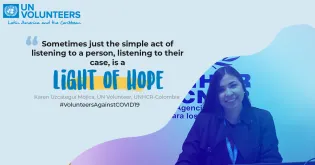Amid the crisis due to coronavirus, UN Volunteers have adapted their work to keep serving the communities. For UN Volunteers, this pandemic is an example that Venezuelans and internally displaced persons of concern need accurate orientation, now more than ever.
"Sometimes just the simple act of listening to a person, listening to their case, is a light of hope [for them]," says Karen Uzcategui Mojica, a UN Volunteer since July 2019. Karen's dedication to the refugee community was evident throughout the interview for this article, as she explained the intricacies of her work.
As a UN Volunteer assigned to the UN Refugee Agency (UNHCR), Karen serves refugees, asylum seekers, persons in need of international protection, returnees, internally displaced persons and persons at risk of statelessness.
Karen advises people on access to health, education, migratory regularization and asylum procedures, as well as providing information about available services from governmental institutions and civil society. These services can range from shelter, medical assistance and food to legal and psychological counseling.
"Vulnerable people are not aware of the institutional routes to follow and the availability of certain services," she adds. An indisputable sense of longing can be heard in her voice.
Karen wants to reach every person who does not know that there are 29 information kiosks (Puntos de Atención y Orientación) run by UNHCR, and located in border areas and main urban centres across the country. There are more than five million Venezuelans displaced around the world.
For many, Colombia has become home; while for others, Colombia is not the destination, but rather a stop on a long journey. UNHCR works alongside the government, various humanitarian actors and private sector initiatives to help Venezuelans become self-sufficient and integrate into Colombian society.
It was one of these efforts that provided Karen with the platform to find her calling. Before starting her journey as a UN Volunteer, Karen worked for an international non-governmental organization and implementing partner of UNHCR in Arauca, Colombia.
"There, I realized that I like working with people, and particularly the aspect of helping and serving others," Karen shares.
Today, Karen is assigned to the UNHCR Information Kiosk in Bogotá, a city that serves as one of the main destinations to many Venezuelans and internally displaced persons. Bogotá’s Information Kiosk not only offers legal counseling and emotional support for people, but they also conduct protection interviews focused on identifying and providing specialized assistance to persons with specific needs, such as people with serious health conditions, victims of sexual and gender-based violence, women at risk and members of the LGBTI community, among other groups.
"I believe one of our greatest contributions as UN Volunteers is our willingness to attend, guide and listen to each case," she explains. "Each case is different, and it is given the attention and dedication it deserves."
Then, the Coronavirus pandemic reached Colombia...
Karen and her colleagues were very concerned when a national quarantine was declared due to the COVID-19 pandemic.
"We asked ourselves, how are we going to take care of people?’ If they don’t have access to a phone, how are they going to communicate with us?" Karen says.
But phones haven’t stopped ringing! Karen and her colleagues have received a daily average of 40 to 50 phone calls, and a new challenge has emerged: to answer every phone call.
“The demand for our services is overwhelming for the number of people we have," she adds.
Since the beginning of the pandemic, the response and attention has been adjusted to the circumstances and for this reason, protection interviews are shorter, but follow the same purpose, with a greater emphasis on guaranteeing a comprehensive response to persons in need, providing emotional support, and psychological counseling.
"There are days when one says, ‘I can't do it anymore,’ but that willingness makes you get up and put your best face to serve the community." Karen concludes.
UNHCR's response in Colombia is managed by its 11 offices throughout the country, and it has also worked with other UN agencies, as well as national and international non-governmental organizations, to provide humanitarian assistance related to food security and nutrition, water, sanitation and hygiene; health, education and cash-based interventions at attention sites, including along the Colombian-Venezuelan border.
For further information on response for Venezuelans, check here.
This article was written with the kind support of Online Volunteer Nichool Castro.

